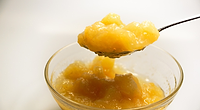Baby Food Safety Act Would Give FDA Authority to Limit Toxic Heavy Metals in Food for Children

Image credit: Phong Duong via Unsplash
To protect the health of young children, U.S. Senators Amy Klobuchar (D-Minnesota) and Tammy Duckworth (D-Illinois) have introduced legislation to limit the levels of toxic heavy metals allowed in foods produced for infants and toddlers. The House companion bill is led by Representatives Raja Krishnamoorthi (D-Illinois) and Tony Cárdenas (D-California).
The Baby Food Safety Act of 2024 would give the U.S. Food and Drug Administration (FDA) the authority to enforce scientifically established limits on heavy metals in commercially produced infant and toddler food (meaning foods represented as being specifically for children up to the age of 24 months). The bill would also set requirements on food manufacturer sampling, testing, and recordkeeping for contaminants in imported and domestic processed food, and would also bring greater transparency to the rate of food facility inspections conducted by FDA in the U.S. and abroad by initiating a study of FDA foreign/domestic inspections.
A food may be determined adulterated at the final product stage if it contains any contaminant in excess of the limits established under the authorities granted by the legislation. Specifically, if passed, the bill would enable FDA to establish limits on:
- Lead, cadmium, mercury, and total arsenic in infant and toddler food
- Lead, cadmium, mercury, and total arsenic in food pouches made with fruit or vegetable puree or juice
- Lead and arsenic in juice
- Additional contaminants in infant and toddler food, juice, and food pouches made with fruit/vegetable puree or juice, if determined appropriate.
The Baby Food Safety Act of 2024 follows a request for expanded authorities made by FDA Commissioner Robert Califf, M.D. during a May 8 Senate subcommittee hearing about the agency’s Fiscal Year 2025 budget request. During the hearing, Dr. Califf asked Congress to make it possible for FDA to require producers of foods for babies to conduct testing for contaminants, and to make testing data available to the agency. Dr. Califf also requested the authority to require manufacturers to report contamination in critical foods, such as infant formula, and to conduct better environmental monitoring.
At the state level, legislation similar to the Baby Food Safety Act was proposed in Maryland in February 2024. Maryland House Bill 97, also known as “Rudy’s Law,” would require baby food manufacturers to test products for toxic heavy metals and make the results available to consumers.
Due to several nationwide food safety crises that have occurred in the U.S. in recent years, concern has been rising with regard to toxic heavy metals and other harmful contaminants in foods intended for babies and young children. For example, in late 2023 into early 2024, the U.S. faced a string of lead poisoning cases in children linked to fruit puree pouches containing imported cinnamon adulterated by lead and chromium. Earlier, in 2022, a nationwide shortage of infant formula was spurred by the closure of a major formula production facility. Infants were sickened, and in some cases, died, after consuming formula that was contaminated with Cronobacter sakazakii and was produced at the closed facility.
Looking for a reprint of this article?
From high-res PDFs to custom plaques, order your copy today!






